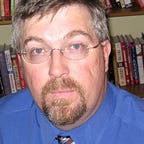Silvio Gesell Has Risen From the Grave
Keynes’ prophet of artificial demand has his revenge
When the European Central Bank introduced a negative interest rate on lenders’ deposits two years ago, few thought things would ever go this far. — Bloomberg, August 11, 2016
To the contrary. Some of us pegged the ECB’s move as the Brave New World of central banking and warned that with the move any objective constraints on monetary policy, and hence modern commercial banking, were gone. And without very much debate at all.
Now, inevitably, a retail bank in Germany will charge depositors 0.4 percent on accounts over EU100,000. As Bloomberg details:
“With our business clients there’s been a negative rate for quite some time, so why should it be any different for private individuals with big balances?,” Josef Paul, a board member of the bank, said by phone on Thursday. “As it looks today, charges on deposits won’t be extended to customers with lower amounts” than 100,000 euros, he said.
Why indeed? And as it looks today. Remember that two years from now when other institutions have come up with their own arbitrary, but absolutely vital to remain solvent, ways of charging depositors for their cash. It is banking turned on its head, precisely as early 20th c. globalist, activist, and theorist Silvio Gesell advocated.
Gesell is the godhead of modern demand manipulation, a “neglected prophet” as John Maynard Keynes termed him. Gesell was among the first to argue that future demand could be pulled forward into the present by manipulating the value of money. Graft on some 19th c. agrarian hatred of bankers and debt, add the experience of a German merchant operating on the Argentine frontier in the 1890s, and you have a sort of Bohemian William Jennings Bryan, if Bryan had spent time in a Berlin vegetarian commune and had served as finance minister for the six-weeks of the Bavarian Soviet Republic.
Until now that eye-blink was the world’s introduction to Gesell’s notion of Freigeld or “free money.” Far from a store of value, Gesell’s concept of money was a consumer of value. To compel spending and discourage saving, Freigeld loses value the longer you hold it. Savings, or capital formation, is thus treated as a form of anti-social hoarding. Indeed, Gesell was quite explicit, “Freigeld forces its holder to buy: it constantly reminds him of his duty as a buyer through the losses it causes him if he neglects to buy.”
Fast-forward to our decade of ZIRP, QE, and now NIRP and recognize that stock buy-backs in the place of actual capital expenditures attest to the de facto Freigeld regime conjured up by central bankers. Capital is no longer invested in future productivity gains, with predictable results: plunging productivity. A steady-state, no growth world may be our future as a result.
Gesell had an answer for that as well. Global government. Or whatever you would call global control of resources. “No private individual, no State, no society may retain any kind of privileges over the land. For we are all natives of the earth,” Gesell wrote, describing his notion of Freiland, or “free land.”
In turn Freiland was a component of Natürliche Wirtschaftsordnung (natural economic order) in which Gesell spun out the most hippy-drippy plea for globalism this side of a Coke commerical.
“There is no English coal and no German potash. For every human being, no matter what state he belongs, has the same right to the ‘British Coal,’ the ‘American oil’ and the ‘German Kalium,’ ” Gesell declared.
This of course reflects the fact that once you reduce money only to a means of exchange, command of land and commodities represents real wealth. So that too must be taken out of private hands and held in a global commons. Gesell was at least unflinchingly honest about where the destruction of money as a store of value leads.
Not so his unknowing 21st century disciples. Demand control via currency manipulation is viewed as the new normal, as are central bank purchases of private sector debt. Actual productive capital investments, the necessary condition for the future production which must twin with future consumption for there to be any of either, is actively discouraged by today’s central bankers. Instead consume, consume, consume is their drumbeat.
And the ghost of old Silvio marches along beside them.
